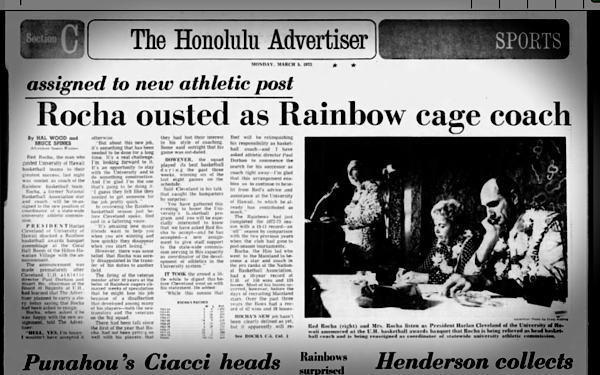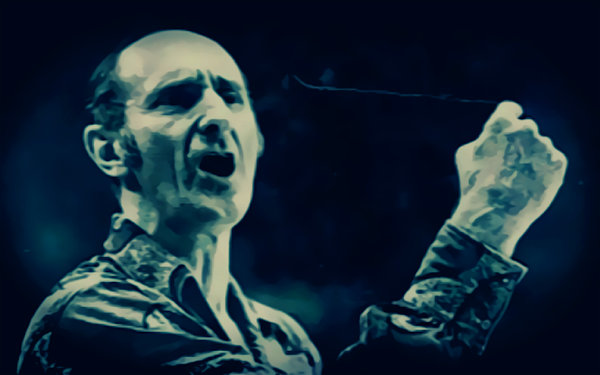By Lance Tominaga, ESPN Honolulu Web Editor.
There’s no doubt that Ephraim “Red” Rocha is a legend in Hawaii’s basketball community. The gangly 6-9 center from Hilo was an All-American at Oregon State and later became the first Hawaii native to play in the NBA. Rocha was a two-time All-Star who helped the Syracuse Nationals capture the 1955 NBA championship. He would go on to coach the Detroit Pistons and, upon returning to the Islands, became the head coach of the University of Hawaii men’s basketball team. He helped found the Rainbow Classic, which for years was college basketball’s preeminent holiday tournament. Perhaps above all, Rocha was the architect of the university’s famed “Fabulous Five” teams, which posted a 47-8 record over two seasons and brought the program’s first-ever NIT and NCAA Tournament berths.
Rocha, who died in 2010, is a member of both the UH Sports Circle of Honor and the Hawaii Sports Hall of Fame.
So why did UH fire him?
The infamous announcement was made the evening of March 4, 1973, during, of all things, the Rainbow Warriors’ postseason awards banquet. Addressing the 500 or so attendees, UH President Harlan Cleveland shared his vision to enhance the school’s athletic programs. He said UH Athletic Director Hugh Durham would spearhead the efforts.
Cleveland then added, “You will be especially interested to know that we have asked Red Rocha to accept – and he has accepted – a new assignment as coordinator of the development of athletics in the University system.”
The audience was stunned. Did he really say…?
Cleveland then lowered the boom: “While this means that Red will be relinquishing his responsibility as basketball coach…”
The crowd gasped. Rocha, who was sitting on the dais with his wife, Ginger, merely looked on in silence.
The next morning, Honolulu Star-Bulletin columnist Jim Hackleman wrote: “The crowd was at first stunned, and then infuriated for the most part. And I’ll admit I was as stunned and infuriated as anyone there.”
Hackleman continued, “I’m not going to make a case for Rocha as a basketball coach, although I know he is highly respected within the profession. I know he has gotten his share of criticism over the years, and no doubt some of it was deserved – although the praise easily outweighed the criticism. I don’t know if he’s having the can tied to his tail, if he’s being kicked upstairs, downstairs or sideways, or if he’s doing this of his own volition.
“I do know, though, that the handling of it was absolutely no class and bush league.”

For his part, Rocha tried to handle the situation with grace. He later told reporters that school officials notified him of their decision the day of the banquet. “They told me what they had in mind, and I accepted. Who knows? Maybe I’ll like the job.”
While an official reason was never given for Rocha’s reassignment, there was no shortage of speculation.
Some observers felt the school and the basketball boosters were unhappy with the season. One year after the Fabulous Five era ended, the Rainbow Warriors “fell” to a 15-11 record. Expectations had been high for that 1972-73 campaign, thanks largely in part to the arrival of U.S. Olympian Tom Henderson. The team started well, winning its first seven games, but slumped badly in January, losing eight of nine. A 15-11 record was still considered respectable, but it was hardly “Fabulous.”
In 10 seasons, Rocha’s record was 110 wins and 135 losses.
Another rumored reason for Rocha’s dismissal was player dissatisfaction. The Honolulu Advertiser reported, “There had been talk since the first of the year that Rocha had not been getting on well with his players, that they had lost their interest in his style of coaching. Some said outright that his game was outdated.”
The players expressed shock at Rocha’s ouster. Said team captain Henderson, “I’m completely surprised.”
Henderson’s backcourt mate, Artie Wilson, said, “I’m shocked. You know, you hear talk. You hear things around town. But that’s what you think it is – [just] talk. I sure didn’t know anything like this was in the works.”
When asked about their personal feelings about the school’s decision, however, every player responded with “No comment.”
Rocha would eventually return to his involvement with Rainbow Warrior basketball as a TV color analyst. To replace Rocha, UH turned to assistant coach Bruce O’Neil. The next season, the Henderson-led ‘Bows went 19-9 and reached the second round of the NIT. O’Neil’s tenure at UH, however, only lasted three seasons. Numerous NCAA violations were uncovered under his watch, and O’Neil and his staff were dismissed.
# # #


